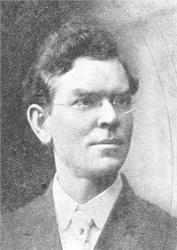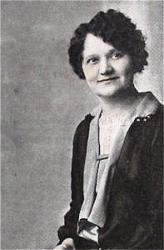1763 - 1841 Person Name: Carl B. Garve, 1763-1841 Author of "Your Word, O Lord, Is Gentle Dew" in Lutheran Book of Worship Garve, Carl Bernhard, was born Jan. 24, 1763, at Jeinsen, near Hannover, where his father was a farmer. He was educated at the Moravian schools in Zeist, and Neuwied, at their Pädagogium at Niesky, and their Seminary at Barby. In 1784 he was appointed one of the tutors at Niesky, and in 1789 at Barby; but as his philosophical lectures were thought rather unsettling in their tendency, he was sent, in 1797, to arrange the documents of the archive at Zeist. After his ordination as diaconus of the Moravian church, he was appointed, in 1799, preacher at Amsterdam; in 1801 at Ebersdorf (where he was also inspector of the training school); in 1809 at Berlin; and in 1816 at Neusalza on the Oder. Feeling the burden of years and infirmities he resigned the active duties of the ministry in 1836, and retired to Herrnhut, where he died June 21, 1841. (Koch, vii. 334-342; (Allgemeine Deutsche Biographie, viii. 392-94, &c.)
Garve ranks as the most important of recent Moravian hymnwriters, Albertini being perhaps his superior in poetical gifts, but certainly not in adaptability to church use. His better productions are almost entirely free from typically Moravian features; and in them Holy Scripture is used in a sound and healthful spirit. They are distinguished by force and at the same time elegance of style, and are full of deep love and devotion to the Saviour. Many of them have passed into the German Evangelical hymnbooks, no less than 36 being included in the Berlin Gesange-Buch 1829; and of those noted below No. i. is to be found in almost all recent German collections. They appeared mostly in the two following collections, both of which are to be found in the Town Library, Hamburg: (1) Christliche Gesänge, Görlitz, 1825, with 303 hymns, a few being recasts from other authors. (2) Brüdergesange, Gnadau, 1827, with 65 hymns intended principally for use in the Moravian Communion.
Garve's hymns in English common use are:—
i. Dein Wort, 0 Herr, ist milder Thau. Holy Scripture. Perhaps his finest hymn. 1825, as above, p. 51, in 7 st. of 8 l. Included, as No. 410, in the Berlin Geistliche Lieder S., ed. 1863, and in the German hymnbooks for Hannover, 1883, for the kingdom of Saxony, 1883, for the province of Saxony, 1882, &c." Translated as:—
1. Thy Word, 0 Lord, like gentle dews. A good translation of st. i.-iii, by Miss Winkworth, in the first Ser., 1855, of her Lyra Germanica, p. 36. In the Pennsylvania Lutheran Church Book, 1868, it is No. 314 in full, but rewritten to D.C.M. In 1864 it was included, altered, and with 11. 5-8 of each stanza omitted, as No. 681 in Hymns of the Spirit, Boston, U. S., and this has been repeated in Dr. Martineau's Hymns of Praise & Prayer, 1873, and Dr. Allon's Children's Worship, 1878.
2. Thy Word, 0 Lord, is gentle dew. A good translation of st. i.-iii., based on the Lyra Germanica, by Miss Winkworth, as No. 102 in her Chorale Book for England, 1863, and thence, in the Ohio Lutheran Hymnal, 1880.
ii. Hallelujah, Christus lebt. Easter. 1825, as above, p. 105, in 8 st. of 6 1. Included in Knapp's Evangelical Lutheran Songbook, 1850, No. 565. Translated as:—
Hallelujah! Jesus lives! A good translation (omitting st. iv., vi.) by Miss Borthwick, in the 4th Ser., 1862, of the Hymns from the Land of Luther, p. 30 (1884, p. 201). In Lyra Messianica, 1864, p. 295, and in G. S. Jellicoe's Collection, 1867, No. 103, it begins, "Alleluia ! Jesus lives."
iii. O Vater der Gemeine. Trinity Sunday. 1825, as above, p. 18, in 3 st. of 7 l. Included as No. 107 in Knapp's Evangelischer Lieder-Schatz, 1837. Translated as: --
Father of all created. In full, as No. 159, in Dr. Pagenstecher's Collection, 1864, signed " F. C. C."
Another translation is, "0 Father, we adore Thee," in the British Herald, Oct. 1866, p. 324, repeated as No. 416 in Reid's Praise Book, 1872.
Hymns not in English common use:— «
iv. Der Herr ist treu, Der Herr ist ewig treu. God's Faithfulness. 1825, p. 5, in 6 st., repeated in the Berlin Gesang-Buch, 1829, No. 60, beginning "Gott ist treu." Translated by N. L. Frothingham, 1870, p. 253.
v. Geduld! Geduld! ob's stürmisch weht. Trust in God. 1825, p. 180, in 3 st., repeated in the Berlin Gesang-Buch 1829, No. 593, beginning "Geduld! wie sehr der Sturm auch weht." Translated by N. L. Frothingham, 1870, p. 265.
vi. Sagt was hat die weite Welt. Holy Scripture. 1825, p 49, in 6 st. Translated as “Tell me, can the world display," in the British Herald, Nov. 1866, p. 360, repeated as No. 420 in Reid's Praise Book, 1872.
vii. Wer bin ich, Herr, in deinem Licht. Self-Examination, 1825, p. 216, in 15 st. Translated by N. L. Frothingham, 1870, p. 258.
viii. Zur Arbeit winkt mir mein Beruf. Before Work, 1825, p. 233, in 9 st. Translated by E. Massie, l861.
A hymn sometimes ascribed to Garve is noted under "Gib deinen Frieden uns." [Rev. James Mearns, M.A.]
-- John Julian, Dictionary of Hymnology (1907)
Carl Bernhard Garve


 My Starred Hymns
My Starred Hymns








